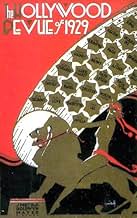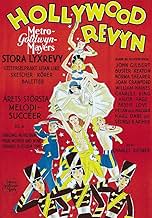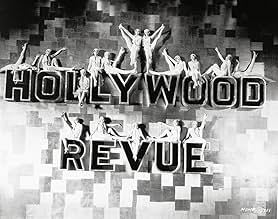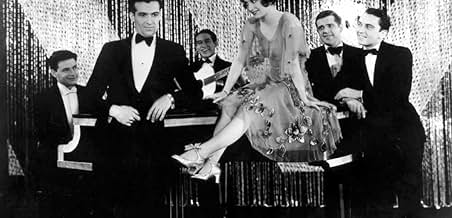IMDb रेटिंग
5.7/10
2.4 हज़ार
आपकी रेटिंग
अपनी भाषा में प्लॉट जोड़ेंAn all-star revue featuring MGM contract players.An all-star revue featuring MGM contract players.An all-star revue featuring MGM contract players.
- निर्देशक
- लेखक
- स्टार
- 1 ऑस्कर के लिए नामांकित
- 1 जीत और कुल 1 नामांकन
Cliff Edwards
- Ukelele Ike
- (as Ukulele Ike)
Nils Asther
- Nils Asther
- (काटे गए सीन)
Brox Sisters
- The Brox Sisters
- (as Brox Sisters - Singing Trio)
फ़ीचर्ड समीक्षाएं
This film will not get a good reception from most modern audiences, and certainly much of the film shows its seventy plus years, but this is a delight for some of us who see the '20s as a golden age, and this movie as a small window into it. It is also a humble reminder that in seventy-five years or so, what we consider entertainment will hold little or no interest to mass audiences.
If you are familiar at all with who the people are (Jack Benny, Joan Crawford, Cliff Edwards, Buster Keaton, etc.), the film is worth seeing. All of these people were one of a kind, not to be replicated by big name performers of today (great stars in their own right, but sorry, folks, they just don't have the class!). Just to see Joan Crawford as a young and beautiful woman is worth watching the film!
Technically, of course, the movie is what it says it is--a revue--intended to show audiences that their favorite silent stars can function in the new medium of sound. That purpose fulfilled (more or less), the film now might seem to have no point. The passage of time and the loss of context have made some of the humor corny (a term, by the way, from that period). The editing is clumsy (we have learned from their mistakes), but the personages themselves, and some of the song and dance, are better than anything we have today, and could not be duplicated.
I'd rather watch this than anything on the screen now.
If you are familiar at all with who the people are (Jack Benny, Joan Crawford, Cliff Edwards, Buster Keaton, etc.), the film is worth seeing. All of these people were one of a kind, not to be replicated by big name performers of today (great stars in their own right, but sorry, folks, they just don't have the class!). Just to see Joan Crawford as a young and beautiful woman is worth watching the film!
Technically, of course, the movie is what it says it is--a revue--intended to show audiences that their favorite silent stars can function in the new medium of sound. That purpose fulfilled (more or less), the film now might seem to have no point. The passage of time and the loss of context have made some of the humor corny (a term, by the way, from that period). The editing is clumsy (we have learned from their mistakes), but the personages themselves, and some of the song and dance, are better than anything we have today, and could not be duplicated.
I'd rather watch this than anything on the screen now.
MGM used to boast that they had more stars than were in the heavens. This transitional picture shows some "stars", people who still have name recognition. Some of the performers were near the end of their career, some at the beginning, and others, probably did not have much of a career before or after this.
There's no real plot - it's pretty much a variety show hosted by Conrad Nagle and Jack Benny. There are some historical moments here - the first performance of "Singing in the Rain", the alleged cause of John Gilbert's career nosediving, Joan Crawford singing and dancing, some slapstick from Laurel & Hardy. There are appearances by the stunningly beautiful Anita Page who looks kind of sad while Conrad Nagle appears to be singing to her. William Haines, just before Louis B. Mayer ended his acting career, eating part of Jack Benny's clothing. Bessie Love appeared to come from one of Jack Benny's pockets - she said there was a $100 bill in the pocket, Benny quips that it's not his suit.
Parts of this was the inspiration of the movie "Singing in the Rain", which was done 20+ years later.
The pluses to this: some color sequences, including the closing performance of "Singing in the Rain", a weird dance sequence by Buster Keaton, who remains mute, and it's a great glimpse into Hollywood as it transitioned from the Silent Era to the age of "talkies". One interesting thing was the cameras weren't as static as they were for many of the early "talkies". There's also a kind of experimental dance sequence where it appears that they used some of the negatives in place of the processed film.
Some of the minuses are it wasn't a smooth transition from the Silent Era to the age of "talkies" - the sound quality is very inconsistent. Some people sounded kind of muffled, some people's voices weren't picked up very well. The version that was played by TCM on 8/4/08 wasn't closed captioned, so if you can't understand what someone is saying or singing, you don't have any captioning to help you out.
This is a good movie if you are interested in relatively early movies - it's almost 80 years old. It's also a chance to see some performers that didn't appear very often.
There's no real plot - it's pretty much a variety show hosted by Conrad Nagle and Jack Benny. There are some historical moments here - the first performance of "Singing in the Rain", the alleged cause of John Gilbert's career nosediving, Joan Crawford singing and dancing, some slapstick from Laurel & Hardy. There are appearances by the stunningly beautiful Anita Page who looks kind of sad while Conrad Nagle appears to be singing to her. William Haines, just before Louis B. Mayer ended his acting career, eating part of Jack Benny's clothing. Bessie Love appeared to come from one of Jack Benny's pockets - she said there was a $100 bill in the pocket, Benny quips that it's not his suit.
Parts of this was the inspiration of the movie "Singing in the Rain", which was done 20+ years later.
The pluses to this: some color sequences, including the closing performance of "Singing in the Rain", a weird dance sequence by Buster Keaton, who remains mute, and it's a great glimpse into Hollywood as it transitioned from the Silent Era to the age of "talkies". One interesting thing was the cameras weren't as static as they were for many of the early "talkies". There's also a kind of experimental dance sequence where it appears that they used some of the negatives in place of the processed film.
Some of the minuses are it wasn't a smooth transition from the Silent Era to the age of "talkies" - the sound quality is very inconsistent. Some people sounded kind of muffled, some people's voices weren't picked up very well. The version that was played by TCM on 8/4/08 wasn't closed captioned, so if you can't understand what someone is saying or singing, you don't have any captioning to help you out.
This is a good movie if you are interested in relatively early movies - it's almost 80 years old. It's also a chance to see some performers that didn't appear very often.
....suddenly it was decreed that everyone had to do one? That's what was happening in 1929, except it was naked voices, not naked bodies that were being revealed. No one could hear the stars talk, so they got to imagine what their voices were like. They also got to imagine what they were saying, or read it on the occasional title card. With sound, they heard the voices themselves and also the lines written for them. Conrad Nagel comes out sounding like the elegant gentleman he was. John Gilbert's voice is a little high pitched, (rumor has it that Louie Mayer, who hated him, had the sound track sped up), and effected. In his first film after this, he was asked to say "I love you, love you! about a dozen times during a love scene- a sequence parodied in "Singing in the Rain", and the audience laughed. Clara Bow revealed her thick Brooklynese, which seemed to belie her image as a gay party girl. Greta Garbo had a deep voice with a thick Swedish accent- just like the audience had imagined. Ben Turpin, the cross-eyed comedian, played against his image by playing swash-buckling heroes in the silents. Talkies revealed he sounded like he looked and made his films a little too ridiculous.
When you watch Hollywood Revue of 1929 and other films of that year, you are looking at some very nervous people who's recently minted stardom was threatened with extinction. And few of them made it. Those who did, like Joan Crawford, made it for reason not apparent in this musical review. In the early 30's, a deluge of stage stars like Spencer Tracy, Humphrey Bogart, James Cagney, Paul Muni, Katherine Hepburn, etc. would sweep them away and provide us with the stars of Hollywood's Golden Age.
When you watch Hollywood Revue of 1929 and other films of that year, you are looking at some very nervous people who's recently minted stardom was threatened with extinction. And few of them made it. Those who did, like Joan Crawford, made it for reason not apparent in this musical review. In the early 30's, a deluge of stage stars like Spencer Tracy, Humphrey Bogart, James Cagney, Paul Muni, Katherine Hepburn, etc. would sweep them away and provide us with the stars of Hollywood's Golden Age.
This is the very first of the all-star, no-plot revues that proliferated during 1929 and 1930. Just about every star at Metro is featured, and there are many fun sequences to be savored in this film. The most famous one is probably the Joan Crawford segment, where she sings and dances to "Gotta Feeling For You". Her singing is passable, and her dancing is, well, "energetic". Marion Davies seems quite nervous in her "Tommy Atkins On Parade" number, but Bessie Love is pretty good in her wild acrobatics. Marie Dressler is fun, as always, and you can glimpse Carla Laemmle as the pearl in the oyster during "Tableau Of Jewels", which opens the second half. John Gilbert's speaking voice dosen't sound nearly as bad as had been rumored, even when considering the antiquity of the recording. The "Singin' In The Rain" number is fun, and offers a good contrast to the more famous one in the film of the same name. There are some special effects and two-color Technicolor that must have wowed the audiences back then, and it's been said that during the premiere, the theater put a gallon or so of orange-scented perfume into the ventilators during the "Orange Blossom Time" finale. In all, this film is well worth a look if you are into early sound films of historical value.
I watched the tape I had made on 4/18/02 again today and read over some of the comments that have been made on this old curio and I felt the need to add a few more observations of my own.
- Firstly, I enjoy watching old films. I see them not as competitors with current entertainment but as portholes into the past. I see the past as a series of presents and the present as living history that we are privileged to witness. Old films allow us to `look' at past era, such as 1929, up close. Each era contains its classics, such as this same year's `All Quiet on the Western Front', that are so good that they are timeless. But most of what was created was material such as Hollywood Review of 1929, designed to provide entertainment for the masses, to the tastes of the age. These people were not making this film to entertain us but rather to entertain the audiences of 1929. They must have done a good job, as this was a big hit. There is plenty of material being produced today that will look just as silly to future generations. Some of it looks pretty silly right now.
- Keep in mind that while the cinema was three decades old at this time, sound recording was an infant. Not only do we hear the `clump clump clump of the dancer's feet but the limitations imposed on the camera by the new technology had stripped a generation of innovations from the medium and what we have is a very flat rendering of a stage review. In time, Hollywood would rediscover how to make films- essentially they filmed much of them in silence and added what sounds they wished us to hear afterwards. We could hear the tap of Fred Astaire's shoes but the clump of the dancer's feet would be muted. The songs would be dubbed in under controlled conditions in a studio. The same presentation would have been done a lot better just a few years later. But this is the best that could be done in 1929.
- In the wake of the development of sound, Hollywood rushed out movies that exploited the new technology as fast as they could, (this one was put together in 28 days), just as a lot of films today use computer generated monsters, armies, cliffs, etc., just to show off what they can do. We have to remember what a miracle watching movies stars talk must have seemed like at the time. Whenever a technical process becomes a drawing card in itself, other aspects of the movies are going to suffer- just as today we see many movies designed simply to show off computer technology that neglect to create human characters we can relate to or tell a coherent plot. I'm not sure I wouldn't rather see `Hollywood Revue of 1929' again than to see `Van Helsing' again. I wonder what the cast of the first would have thought of the second. They might have liked their product a little better.
- It was decided that the best way to exploit the new medium was to produce musicals. Talking was fine but people wanted to hear music, as well. And singing and dancing filled the bill. But the people who had become silent movie stars were not necessarily talented musical performers. Joan Crawford was a chorus girl but that's a long way from being a lead singer or dancer. Imagine modern Hollywood putting on a show like this- with Tom Cruise playing comic foil to some Saturday Night Live types and Julia Roberts dancing and singing. Would it come out any better?
It's best not to be too critical and just look through the crystal ball of the TV at the year nineteen hundred and twenty nine, up close and personal.
- Firstly, I enjoy watching old films. I see them not as competitors with current entertainment but as portholes into the past. I see the past as a series of presents and the present as living history that we are privileged to witness. Old films allow us to `look' at past era, such as 1929, up close. Each era contains its classics, such as this same year's `All Quiet on the Western Front', that are so good that they are timeless. But most of what was created was material such as Hollywood Review of 1929, designed to provide entertainment for the masses, to the tastes of the age. These people were not making this film to entertain us but rather to entertain the audiences of 1929. They must have done a good job, as this was a big hit. There is plenty of material being produced today that will look just as silly to future generations. Some of it looks pretty silly right now.
- Keep in mind that while the cinema was three decades old at this time, sound recording was an infant. Not only do we hear the `clump clump clump of the dancer's feet but the limitations imposed on the camera by the new technology had stripped a generation of innovations from the medium and what we have is a very flat rendering of a stage review. In time, Hollywood would rediscover how to make films- essentially they filmed much of them in silence and added what sounds they wished us to hear afterwards. We could hear the tap of Fred Astaire's shoes but the clump of the dancer's feet would be muted. The songs would be dubbed in under controlled conditions in a studio. The same presentation would have been done a lot better just a few years later. But this is the best that could be done in 1929.
- In the wake of the development of sound, Hollywood rushed out movies that exploited the new technology as fast as they could, (this one was put together in 28 days), just as a lot of films today use computer generated monsters, armies, cliffs, etc., just to show off what they can do. We have to remember what a miracle watching movies stars talk must have seemed like at the time. Whenever a technical process becomes a drawing card in itself, other aspects of the movies are going to suffer- just as today we see many movies designed simply to show off computer technology that neglect to create human characters we can relate to or tell a coherent plot. I'm not sure I wouldn't rather see `Hollywood Revue of 1929' again than to see `Van Helsing' again. I wonder what the cast of the first would have thought of the second. They might have liked their product a little better.
- It was decided that the best way to exploit the new medium was to produce musicals. Talking was fine but people wanted to hear music, as well. And singing and dancing filled the bill. But the people who had become silent movie stars were not necessarily talented musical performers. Joan Crawford was a chorus girl but that's a long way from being a lead singer or dancer. Imagine modern Hollywood putting on a show like this- with Tom Cruise playing comic foil to some Saturday Night Live types and Julia Roberts dancing and singing. Would it come out any better?
It's best not to be too critical and just look through the crystal ball of the TV at the year nineteen hundred and twenty nine, up close and personal.
क्या आपको पता है
- ट्रिवियाIn the "Singin' in the Rain" finale, Buster Keaton is shown carrying a small package in his left hand. This visual gag is a reference to Uneeda Biscuits, then a popular product made by Nabisco. The Uneeda Biscuit trademark showed a small boy wearing a yellow rain slicker and hat (similar to the outfits that the cast is wearing in this number) and walking home in the rain with a package of Uneeda Biscuits under his arm.
- गूफ़After Cliff Edwards' opening number, one of the chorus girls in the background is chatting away with the girl next to her, when a sudden cut appears, and the same girl is now stone still (apparently the director told her in between to stop talking, and pay attention).
- इसके अलावा अन्य वर्जनSome sources list the original running time of "Hollywood Revue of 1929" as 130 minutes. At least two sequences in the original roadshow version are missing from current prints: an opening recitation by the showgirls who are seen posing in the "Hollywood Revue" sign after the opening credits, and the appearance of Nils Asther, who assisted Jack Benny in introducing the final "Orange Blossom" number.
- कनेक्शनAlternate-language version of Wir schalten um auf Hollywood (1931)
- साउंडट्रैकSingin' in the Rain
(1929) (uncredited)
Music by Nacio Herb Brown
Lyrics by Arthur Freed
Played during the opening by The MGM Symphony Orchestra
Played on ukulele and sung by Cliff Edwards and The Brox Sisters; Danced by chorus
Sung by the major stars at the end
टॉप पसंद
रेटिंग देने के लिए साइन-इन करें और वैयक्तिकृत सुझावों के लिए वॉचलिस्ट करें
- How long is The Hollywood Revue of 1929?Alexa द्वारा संचालित
विवरण
- रिलीज़ की तारीख़
- कंट्री ऑफ़ ओरिजिन
- आधिकारिक साइट
- भाषा
- इस रूप में भी जाना जाता है
- Hollywood Revue
- फ़िल्माने की जगहें
- उत्पादन कंपनी
- IMDbPro पर और कंपनी क्रेडिट देखें
बॉक्स ऑफ़िस
- दुनिया भर में सकल
- $52,77,780
- चलने की अवधि2 घंटे 10 मिनट
- रंग
इस पेज में योगदान दें
किसी बदलाव का सुझाव दें या अनुपलब्ध कॉन्टेंट जोड़ें

टॉप गैप
By what name was The Hollywood Revue of 1929 (1929) officially released in India in English?
जवाब





































